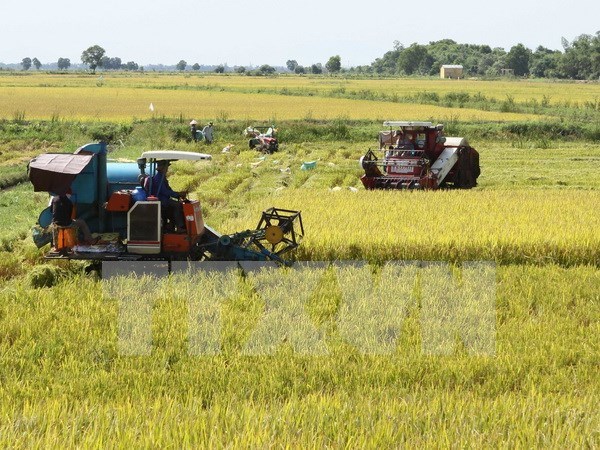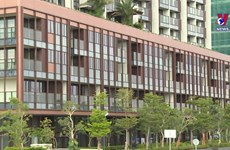Australia seeks hi-tech agriculture link with Mekong Delta
The Australian Consulate General in the southern metropolis of Ho Chi Minh City worked with the Department of Agriculture and Rural Development in the Mekong Delta city of Can Tho on June 12 to explore cooperation in hi-tech agriculture in the coming time.
 A rice field in the Mekong Delta (Photo: VNA)
A rice field in the Mekong Delta (Photo: VNA)Cao Thi Thanh from the Consulate General said Australia has developing hi-tech agriculture, while Vietnam and the Mekong Delta particularly boast large potential in this sphere.
She cited Australian statistics that only one percent of land in the country is suitable for agricultural production with the involvement of four percent of the population.
However, Australia has the
highest proportion of self-supplier of farm produce in the world. Averagely, an
Australian farmer could produce farm produce for 190 people.
Apart from
domestic provision, 80 percent of the farm produce is exported. The income of an
Australian farmer amounts to 100,000 USD per year.
She noted that Australia wants to seek cooperation opportunities with the Mekong Delta in technology and human resources training.
Vice rector of Can Tho University Le Viet Dung said the delta has recorded significant strides in the field of high technology with many products receiving good feedback.
Such partners as Japan and China are stepping up investment in agricultural machines. Thereby, Australia should conduct fact-finding trips to produce highly competitive machines.
Professor Le Van Hoa said the weakness of the Vietnamese agriculture lies at post-harvest losses, especially for rice, animal husbandry, vegetables and fruits.
This is attributed to the country’s limitations in processing, preservation and transport, he said, adding that Australia is strong in technology, harvest chain, processing and transport of farm produce.
He hoped Australia will introduce the latest machines to increase the region’s post-harvest efficiency, quality of products, and farmers’ income.
This will be a key factor to help Vietnamese farm produce meet Global Good Agricultural Practices (GlobalGAP), he added.
Dung also suggested exchanging experts and opening training courses and workshops as well as expanding effective production and processing models.-VNA
She noted that Australia wants to seek cooperation opportunities with the Mekong Delta in technology and human resources training.
Vice rector of Can Tho University Le Viet Dung said the delta has recorded significant strides in the field of high technology with many products receiving good feedback.
Such partners as Japan and China are stepping up investment in agricultural machines. Thereby, Australia should conduct fact-finding trips to produce highly competitive machines.
Professor Le Van Hoa said the weakness of the Vietnamese agriculture lies at post-harvest losses, especially for rice, animal husbandry, vegetables and fruits.
This is attributed to the country’s limitations in processing, preservation and transport, he said, adding that Australia is strong in technology, harvest chain, processing and transport of farm produce.
He hoped Australia will introduce the latest machines to increase the region’s post-harvest efficiency, quality of products, and farmers’ income.
This will be a key factor to help Vietnamese farm produce meet Global Good Agricultural Practices (GlobalGAP), he added.
Dung also suggested exchanging experts and opening training courses and workshops as well as expanding effective production and processing models.-VNA













